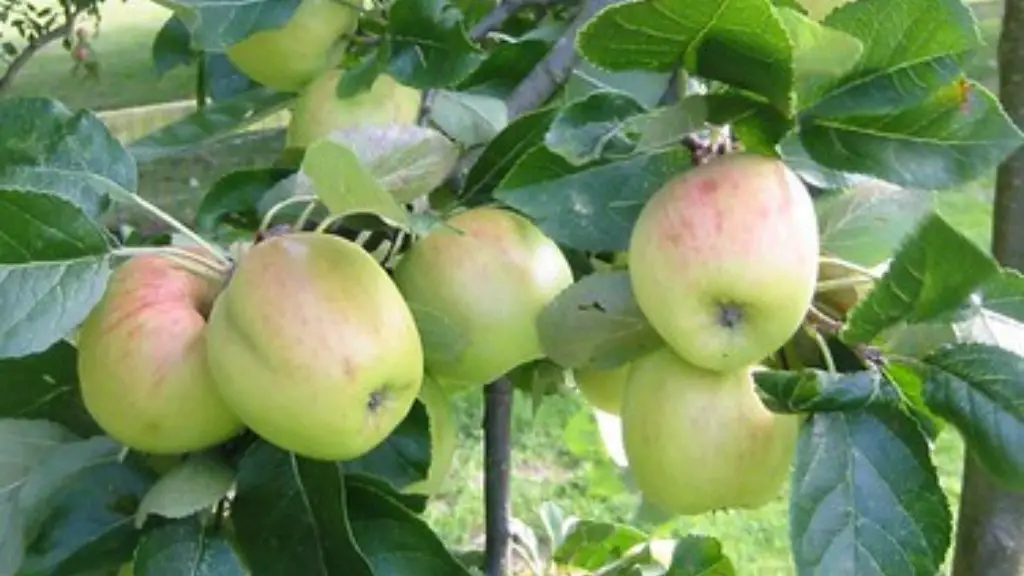My apple tree has not produced apples for several years now. It had plenty of foliage and branches, but the appearance of fruit did not happen. In discussing this issue, I looked at all the common causes that would cause a tree to not produce fruit. The lack of pollination, drought, water, cultural practices, pest infestation and nutrient deficiencies were all ruled out. After much research, I determined that environmental conditions, genetics and nitrogen availability were the likely culprits for my apple tree not bearing fruit.
Environmental conditions such as winter temperature extremes can influence blossoming and pollination processes and fruit production. Low temperatures may prevent young fruits from forming and too much heat can accelerate fruit maturation, causing them to drop prematurely. Extreme summer and winter temperatures can also disrupt the growth cycle of the apple tree and reduce and delay fruit set.
Genetics of the apple tree can also play a role in fruitlessness. Some apple tree varieties have been bred to have qualities such as interesting foliage, abundant flowering or a particular form – leaving little energy available for fruit production. Furthermore, some types of apple trees are known to bear fruit only every other year. This is called ‘biennial bearing’. Thus genetics may be limiting the fruit production of my apple tree.
Finally, nitrogen availability may be a factor in apple tree’s fruitlessness. Nitrogen influences many facets of plant growth and development, including root expansion, stem growth, and flowering. If nitrogen is lacking, the tree will not be able to produce anyway near enough flowers and fruits. An excessive amount of nitrogen on the other hand can stimulate lethal floral infections. Therefore, nitrogen availability may be the reason for my apple tree not producing apples.
Winter Temperature Extremes
Temperature plays an important role in affecting the flowering and pollination processes of an apple tree. The extent of this influence will depend on the hardiness zone of the apple tree that is determined by the average extreme temperature during a winter season. Low temperature extremes during winter can significantly affect the apple tree’s flowering process by reducing the number of flowers produced. Flowering is greatly reduced below the critical temperature threshold for the apple tree that is particular to its growth zone. This means that if there are winter temperature extremes that are too low, the apple tree’s flower production is greatly reduced. This can ultimately leads to fruitlessness as there will be no pollination and subsequent fruit development.
Genetic Factors Limiting Fruiting
The genetics of an apple tree is a factor that influences its ability to yield good fruit production. Some apple tree varieties are bred to have specific features such as a certain form or outstanding foliage, leaving little energy available for fruit production. Furthermore, certain apple tree varieties are known to bear fruit only every other year and this is called ‘biennial bearing’. All these scenarios can be possible explanations as to why an apple tree may be producing more flowers than fruits.
Nitrogen Influences on Fruiting
The availability of nitrogen in the soil plays a key role in the apple tree’s ability to produce flowers and fruits. Nitrogen essentially depicts how large and fast the apple tree will grow and establish its root system. Without enough nitrogen, the apple tree will not produce enough flowers, which would consequently limit the potential for fruit production. In addition, it can stimulate floral infections if it does not reach steady levels and is given in excessive amounts.
Root System and Nutrition
An efficient root system is another factor that affects an apple tree’s ability to produce fruits. The root system is a key factor that contributes to the apple tree bearing enough apples. An apple tree needs a large root system to effectively uptake the water, minerals and nutrition it needs to survive. If a root system is lacking in size and energy due to weather, disease and temperature fluctuations, the apple tree will be less able to capture the nutrition it needs to produce fruit. Thus, insufficient nutrients in the soil due to a poor root system can contribute to the lack of fruit production of the apple tree.
Lack of Pollination and Insect Activity
The apple tree also needs pollination from bees and other insects to form fruit. As bees and other insect activities decline due to overuse of insecticides, destruction of natural habitats and other environment influences, the apple tree’s ability to be pollinated is reduced. This ultimately leads to reduced fruit production as the apple tree will not be able to set as many fruits as it could have if it was adequately pollinated.
Water and Soil
The soil of the apple tree’s location is also a factor that affects its ability to bear fruit. Sandy or light soils need to be watered more frequently than heavy soils to ensure adequate water amount for the apple tree to be able to flourish and produce fruit. This could be an issue for my apple tree as there could be a lack of regular, adequate water in its environment. Therefore, water availability for the apple tree could be limited, leading to reduced fruit production.
Diseases and Pests
Diseases and pests are also detriments to an apple tree’s ability to bear fruit. Diseases such as apple scab, fire blight and powdery mildew or pests such as aphids, mites and codling moths can reduce or eliminate the amount of fruit the apple tree produces. These diseases and pests can take away the energy and resources that the apple tree needs to produce fruits, leading to fruitlessness. Therefore, it is possible that pests and/or diseases have contributed to reduced production of fruit on my apple tree.

